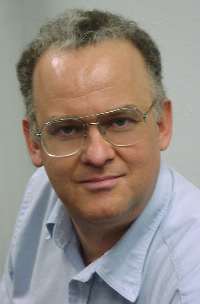Research interests
I am interested in molecular manufacturing
(also called molecular nanotechnology,
see my video introduction).
The central objective of molecular manufacturing is the design, modeling, and
manufacture of systems that can inexpensively fabricate most products that can
be specified in molecular detail. This would include, for example, molecular
logic elements connected in complex patterns to form molecular computers, molecular robotic arms or Stewart platforms (e.g., positional devices) able to position individual atoms or clusters of atoms
under programmatic control (useful if we wish to make molecular computers and
other molecular manufacturing systems), and a wide range of other molecular
devices. A central concept for achieving low cost in molecular manufacturing
is that of massive parallelism, either by self replicating manufacturing systems or convergent
assembly. Such systems are today theoretical, but should revolutionize 21st
century manufacturing. The marginal manufacturing costs for such systems should
be quite small, although initial R&D costs might be quite high. I served
for several years as an executive editor of the journal
Nanotechnology. I chaired
both the Fourth and Fifth Foresight Conferences on Molecular Nanotechnology;
and won the 1998 Feynman
Prize in Nanotechnology for theory. Robert Freitas and I formed the
Nanofactory Collaboration.
I have a broad interest in computer security and a particular interest
in cryptography, having co-invented public key cryptography (for which I received
the ACM Kanellakis Award, the IEEE
Kobayashi Award, the RSA
Award in Mathematics, the IEEE
Hamming Medal (see Stanford's
article), was inducted into the National
Inventors Hall of Fame, was named an IACR
Fellow and a Fellow of the Computer History Museum). I also invented Merkle
signatures, based on Merkle
trees. Michael Szydlo developed log space traversal of Merkle trees. See
Handbook of Applied Cryptography for an excellent technical treatment
of cryptographic methods, and Crypto
for a great read about the people involved. My
first paper (and, in fact, the first paper) on public key cryptography
was submitted in 1974 and initially rejected
by an unknown "cryptography expert" because it was "...not in
the main stream of present cryptography thinking...."
Concepts related to bitcoin can be used to improve governance by using a DAO Democracy. Here's a paper on the subject, and some videos: 1, 2.
Quantum computers and public-key cryptosystems
NISTs Post-Quantum Cryptography page links to the quantum resistant public key "Candidates to be Standardized" as of July 5th, 2022.
Recent news on the NIST Post-Quantum Crypto Project
The likely development of quantum computers (QCs) in the next one or two decades
would compromise all widely used public-key cryptosystems (PKCSs). This includes
RSA, ECC, DHM, DSA, and various implementations thereof, and any other system
based on the difficulty of factoring or discrete logarithms. The development
of quantum computers might occur rapidly (less than ten years). Such rapid development
could occur in secret, with little or no warning to the public or other interested
parties.
A Google
search shows a great deal of activity in this area.
As the time required to complete the development of post-quantum cryptographic algorithms will be long, and the
time to adopt the resulting standards worldwide will be long, and the time to deploy systems compliant with the adopted standards will be long, quantum computers might be available before a QC-resistant PKCS system is deployed throughout the world.
Organizations
with high security needs should deploy cryptographic systems based on conventional cryptographic algorithms until such time as quantum-resistant algorithms become available.
Researchers in molecular nanotechnology
are more aware than most of the truly remarkable medical advances we can expect
in the next few decades. The ability to arrange and rearrange atoms and molecules
in most of the ways permitted by natural law will enable
revolutionary capabilities, including the full power of a mature nanomedicine,
which should make good health the birthright of all humanity. Disease, disability,
and the infirmities of old age will become rarities; joining polio, the plague
and smallpox as ancient pestilences finally laid to rest by the inexorable
advance of technology. While some of us might have the good fortune to stay
alive and healthy until these medical marvels are available, cryonics
offers a bridge to the future in case we wouldn't otherwise make it. Should
our health fail we can be cryopreserved and cooled to the temperature of liquid
nitrogen. At that temperature, tissue remains essentially unchanged for centuries.
We can preserve ourselves for the few remaining decades until the day when nanomedicine
can heal our injuries and restore our health: as good or better than the health
we enjoyed in our 20's or 30's. For further information, see my
web page on cryonics or my
video introduction to cryonics.
My wife and I joined Alcor (the world's
leading cryonics organization) in 1989. We recommend that anyone interested
in a long and healthy life do likewise. For further information, see the Alcor
FAQ.
I have been an Alcor
Director since May 21, 1998. I chaired the fourth and fifth
Alcor conferences.
Other interests
I'm also interested in
medical applications of nanotechnology, computational
chemistry, reversible
computing, extropians,
and other areas. My wife is Carol
Shaw. My sister, Judith Merkle Riley, wrote historical novels
(1, 2,
3, 4).
My father, Theodore Charles Merkle, ran Project
Pluto. My great uncle was Fred Merkle, of baseball fame. A page of relatives. Some incorrect negative forecasts of future technology. Some interesting talks: The Future will be Decentralized,
The Next Great Era: Envisioning A Robot Society, The end of humanity: Nick Bostrom at TEDxOxford.

